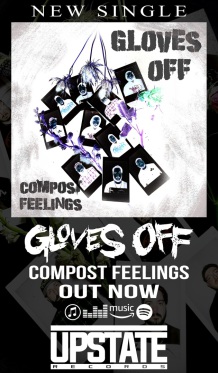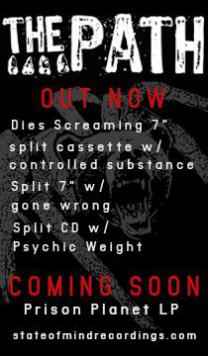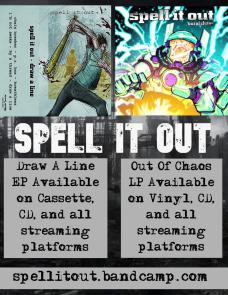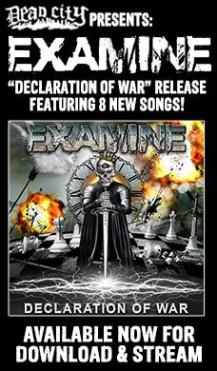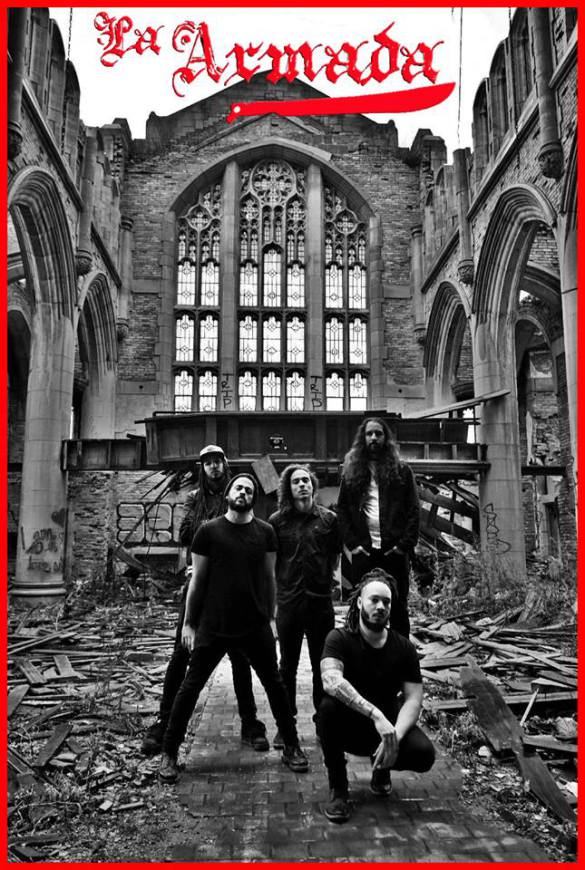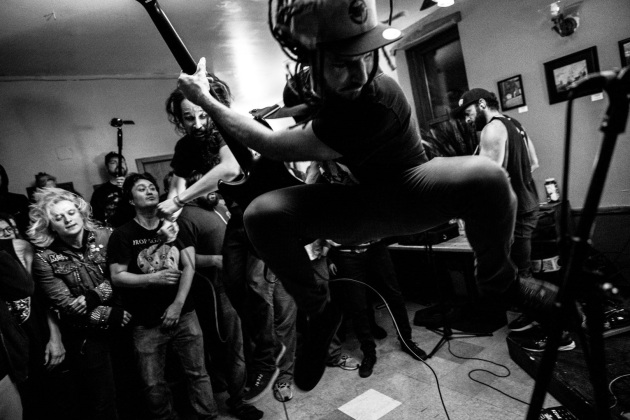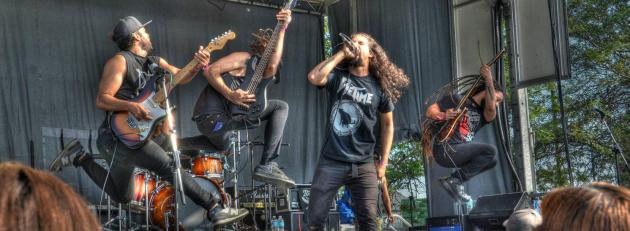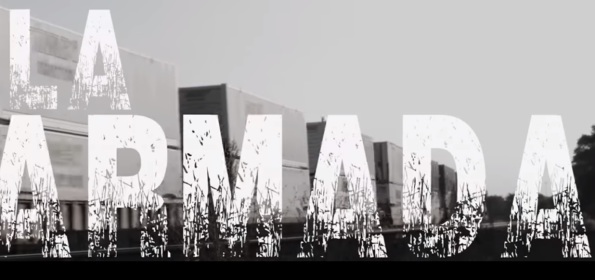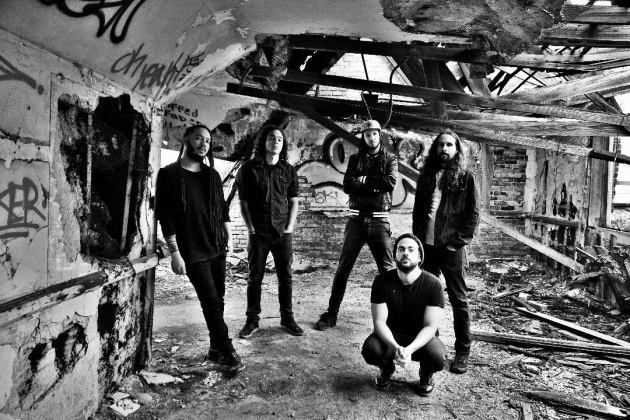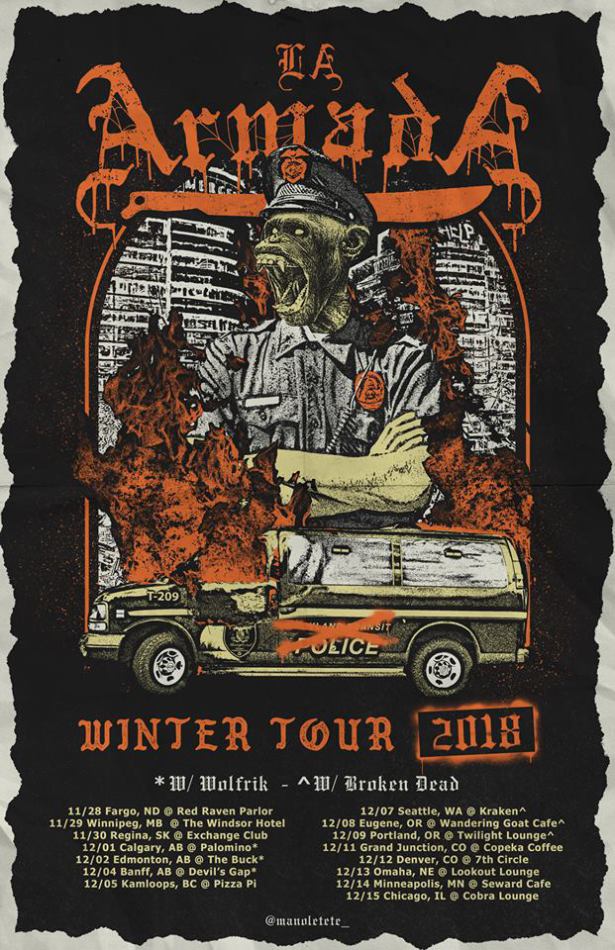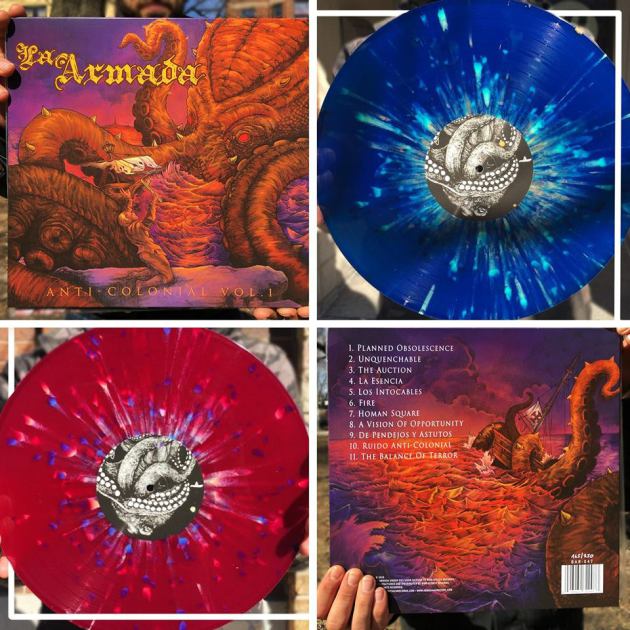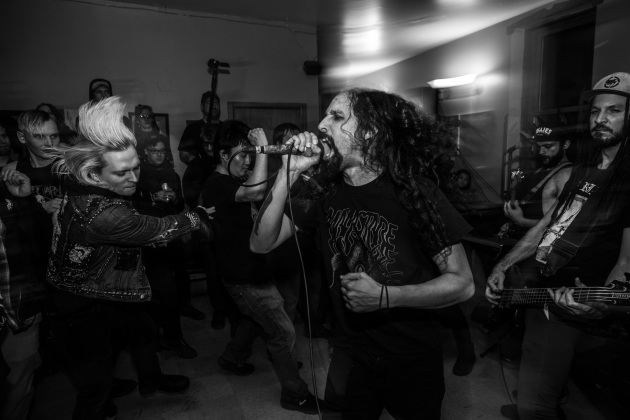We are glad to finally bring you this interview with Chicago’s LA ARMADA, a band who are passionate about what they do having made a full move of all their band members from their home country of the Dominican Republic to the United States. They recently (and on their own accord) toured Canada in December! How is that for passion? Their sound is hard to pin down drawing influences from all over the heavy music spectrum but also includes influences from music that would be associated more with their homeland. Message wise the passion does not let up as some of you reading this interview may end up loving them or hating them. You decide. I initially slept on their promo that was sent in but backtracked and ended up really getting into their “Anti-Colonial Vol-1” that came out last March. La Armada’s sound may not be what you usually expect In Effect to be into but we have open ears here and this one and their story caught our attention. This interview was done in late December 2018 with their bassist Alberto Marte aka Mani, and Paul Rivera their guitarist. Lead graphic by: Bas Spierings, with additional photos by: John Oakes Photo.
IE: The La Armada story has its start in the Dominican Republic in the early 2000's. Can you talk a little about how you went from being a band from The Caribbean, to Florida and who now call Chicago home? What sparked the idea for a move and was it an easy or hard decision?
Mani: Well the band was active in Santo Domingo from 2000-07. During this period we pretty much did everything we could to expand the band both nationally and internationally. From releasing our own records, organizing small tours, booking international bands and running a small D.I.Y distro/label with music from other parts of Latin America and the US. The idea for a move was sparked by how the band’s scenario changed drastically around 2006 during the biggest economic crisis the small country has ever seen. Inflation reached record numbers, unemployment skyrocketed, and financial institutions went bankrupt. This created a massive exodus of young professionals, students and artists looking for a new platform to develop their craft. I used my contacts from years of DIY record trading and moved to Northern Florida and eventually to the city of Chicago. Moving to the states was a difficult challenge. Most of us got in to the country with temporary visas and had to endure a long process of “legalization”. We basically had to start all over again, get jobs, buy gear, buy a van etc. We are very privileged to be where we are now, but it took a lot of work and sacrifices.
IE: You were an already established band back in DR. How was the reaction from family, friends, and fans to the news that you were leaving?
Mani: The reaction was negative overall. Most of our friends and families told us we were crazy for leaving everything behind. Like i said, a lot of young artists left the island during these years, but we don’t know of many bands in which every member decided to leave everything behind to pursue a common goal. It wasn’t until after a few years of grinding that people’s opinions started to shift. Nowadays it’s a different story. People in the island are very proud of what we have accomplished so far, and it feels great to represent our scene internationally or even just make it known that there is a hard rock scene in the middle of the Caribbean because it’s mostly associated with tropical music.
LA ARMADA @ SEWARD CAFE, MINNEAPOLIS, MN DECEMBER 14, 2018. PHOTO BY: JOHN OAKES PHOTO
IE: Was the move made just by the band members themselves or were there girlfriends, wives or kids involved as well?
Mani: It was a band members only situation. Unfortunately everything else was left behind.
IE: What was it like growing up in DR for you and your friends and how did you get introduced to heavy music whether it be metal or hardcore/punk?
Mani: Dominican society is still super conservative. Colonialism is still an institution, the Catholic church is very influential and the youth is encouraged to follow traditional norms, but growing up in the 90’s we had this new thing called the internet, and that was a game changer. See, there was always metal in the local underground scene. Bands like Epsilon, Archaios, and Kryosis just to name a few but metal never really resonated with us too much, we just couldn’t get down with lyrics about worshiping satan and killing people. Our singer Bruka was the only one with a computer at home and I remember he used to spend hours looking for new music. That’s how we discovered hardcore punk and right away we knew this music was speaking to us and the reality we lived in DR. The rest is history.
IE: You have a few releases that are available on Bandcamp but have a total of 4 others that came out between 2003 and 2010. How has La Armada's sound grown over the time you have been recording? If people go back and investigate those earlier releases are they going to find the music to be similar or different to “Anti Colonial Vol 1”?
Mani: I think a big difference in how the band sounds today is that we finally learned how to play our instruments. We didn’t have any real gear in DR, and a lot of times we had to borrow gear to be able to play shows. We have also started to experiment more with Latin beats within punk and hardcore. See, growing up in the Caribbean, it’s is a musical melting pot of rhythms like salsa, merengue, bachata, reggae and rock. Music was pretty much everywhere growing up so by the time we got introduced to punk and hardcore our musical ears where very developed. I think our current sound has also been shaped by the process of migrating to a new country and experimenting alienation from our own culture. When we first got in to punk rock we automatically rejected everything about our culture (homophobia, mysogany, colorisim etc) including Dominican music, but once we moved to the states we started going back to our roots as a way to cope with the struggles of adapting to a different society. I think our current sound is the most honest representation of who we are as a band. Songs like “Homan Square” and “Unquenchable” are perfect examples of how we seamlessly flow from metal to hardcore punk to Latin beats while you bob your head the entire time. That being said, I still think if people go back and check the old school releases, they will find the raw, untouched essence of the band.
IE: Your lyrics and message are obviously a big part of what La Armada is all about and you are not shy about your stances on the topics you sing about. "Unquenchable", "The Auction" and "Fire" seem to be 3 of the tracks on the latest one that come to mind. Can you talk about these tracks and give a short explanation to what each is about?
Mani: “Unquenchable” is probably our most experimental song. Musically there is a lot going on here, we go from metal to hardcore to Afro-Caribbean rhythms like “palos” and “gaga” in under 3 minutes. This song is about the direct relation between the anti-immigrant lobby and the “for profit” prison industrial complex. We comment on the nefarious interests behind this witch hunt of Latino immigrants and how corporations like GEO and CCIS collect millions to run immigration detention centers like businesses where human lives are disposable, and their biggest priority is to make profit at all cost.
"The Auction” is our heaviest track so far. We wanted to write a song where we could show our influences from grind core and power violence but in a way that it still sounds like La Armada. The drumming on this song is challenging because Luis has to be aggressive and groovy at the same time with the back and forth of blast beats and Latin breakdowns. The special thing about the lyrics of this song is that we did not write them. The track is an adaptation from the poem “the slave auction” by abolitionist African-American author Frances Ellen Watkins Harper. To me the song is about slavery in the Americas, but also about the role of black women resisting colonialism and raising strong children capable of enduring the horrors of slavery and its continuation into modern day capitalism.
“Fire” is the one song where we show our raw punk influences. Just straight up fast paced punk with a heavy ass metallic breakdown at the end. We wrote this song basically predicting the Donald Trump presidency and the rise of white nationalism in America.
WATCH THE VIDEO FOR "FIRE" BY CLICKING THE GRAPHIC BELOW
IE: Being born and raised in another country and then moving to the US might give each of you a different perspective to life here that lifelong Americans may not have. Do you view the topics that you sing about as fixable ones or more of a lost cause?
Paul: We’d like to think it’s fixable but there’s not much evidence of that, especially right now. We grew up in a very corrupt country and moving here you quickly realize it’s just as corrupt just in a more white collar way. That being said, we have to allow space for hope. Even if we don’t sound hopeful much of the time, It’s undeniable that we see and live hope every time we take the stage through the connections we are making with people and through the stories we mutually share. For example, when teens or young adults come to us to thank us for the message, for representing their culture, for writing about the issues that affect their lives, there’s hope in that, in knowing that there are people out there wishing for and working towards a better world. We’re glad we grew up where we did and that we didn’t come here until we were already adults, precisely because of the perspective we brought. It’s allowed us to know what customs and mannerisms from back home to continue to apply in life and which to let go of. At the same time, it’s allowed us to pick and choose what aspects of American life to adopt. There are things to learn from both cultures so, it’s a balance.
IE: Moving to Chicago seems to have been a really good decision for the band to make opening yourselves up to new fan bases, touring, among other positives. Outside of everything that involves the band are you happy with making the decision to move? Are you happy with your lives here in the US when it comes to things that are not band related?
Paul: For the most part yes, we’re happy here. We all hate the cold but it’s a small price to pay to live in such a rad city. It makes sense for us for a lot of reasons; the huge Latin punk community, which is one of the main reasons we came here. Geographically, it’s in the middle of the country so we can tour anywhere with relative ease. Aside from band interests, we enjoy living in a big city that feels like a small town at times and we enjoy the more relaxed, Mid-western way of life as opposed to somewhere like NY or LA. It doesn’t hurt that we’ve been able to see most our favorite bands and artist here in town and that there are so many cultural events and museums you can visit. It’s been really enriching. Of course it’s not all positive, we’ve seen and have been victims of police profiling, of theft, have been priced out of neighborhoods and more.
IE: Three things you miss about living in DR and three things that you love about living in Chicago?
Paul: Things we miss about DR: Our families, the beaches and the weather. Things we love in Chicago: The music scene, the food, all the opportunities to be exposed to very diverse cultural events.
IE: From following your band on social media it’s obvious you do a lot of touring. Do all the members of La Armada have regular jobs when you are not out touring and if so what kind of work does everyone do?
Paul: Yes, we are a blue collar, working band. We use our day jobs to fund the band so that there’s never any issues with not being able to take an opportunity because we are short on cash. The goal is always to make the band self-sufficient but we are all financially committed to keep the project going no matter what. As for types of work it’s all over the board, but the common denominator is that we all only take jobs we can come and go from. 2 work service industry and other side gigs, 2 others are longtime construction and maintenance contractors and the other person works at a website. It’s challenging and can be stressful to come and go from jobs so much but we moved here to play music and that’s what we’re gonna do.
IE: To follow up on the last one with all the touring you have done what are some of your favorite cities and towns to play and what makes them so good for you guys?
Paul: Quite a few cities are always on our minds. New York, there is a huge Dominican and Latin-American Diaspora there who are feverish followers of what we do. Minneapolis, which is one of the first cities we ever toured to, they always show up to support and the vibe is both indescribable and unmatchable. There are various cities around the Midwest like Ft. Wayne, IN where we’ve carved out a great niche and then obviously Chicago, where we’ve made our home and have found a supportive and amazing community.
IE: You just completed a tour from November 28th through December 15th that started in North Dakota and headed up into Canada. Can you talk about it, do you book these by yourselves and was Canadian weather in December ever a concern when booking this tour?
Paul: Let me start with the weather, It was definitely a concern but we were either going to hit these cities up now or not till the second half of next year. We were already way overdue in going back to those parts. Some of those cities we visited in 2015 and others just recently in June. We have a good thing going out there and didn’t want to wait that long, so we went thinking “How bad can it be?”. Well, we hit black ice, lost control of the van and ended up in a ditch. A college volleyball team was driving by and they stopped to get us out and we still made the show on time. Sure, it makes for a great story but it was scary as hell. I don’t see us doing it again in winter, it’s dangerous! We have booked almost every single show this band has played for the last 7 or 8 years but very recently (as of June) we started working with booking agents, one for Canada and Europe and one in the US. I don’t recommend that any band work with an agent until they find someone they trust and is responsible. We FINALLY found that in the form of friends we’ve known for years who are now in the position to help us on this front. Booking a 2 or 3 week tour is a lot of work and it takes away from the time you could be practicing or writing so we are happily delegating that responsibility away but we are glad we did it ourselves for so long because the lessons are priceless. Not many people are ever going to put in the same amount of heart and effort that you do for your own project, so until you find people who will bleed with you, it’s best to go at it yourself.
STREAM OR DOWNLOAD LA ARMADA MUSIC BY CLICKING THE GRAPHIC BELOW
IE: The band is obviously very dedicated to what you do with the move, a steady flow of releases, and a lot in the way of touring. Where would you like to be in say 2 to 3 years that makes the members of La Armada feel like this has all been worth it or is it more of a thing where you are taking it one day at a time without set goals?
Paul: Well, it’s a complex question. First of all without the love of our music and our craft, we wouldn’t still be doing it. This band started when we were around 14 to 17 years old and we are now all in our mid-thirties. We face the same challenges and pressures that anyone does as they get older, maybe even more if you consider the immigrant factor and the responsibilities that it conveys, like helping out family back home and dealing with “legal status”.The ideal answer would be to say that in 2 or 3 years we just want to be creating and performing. However, we want to be more than a practice room band and doing this close to full time like we do. That equires money and sacrifices, it’s just the nature of the beast. So the more practical answer is that in 2 or 3 years we want to be writing the best music we ever have, performing the best set we can deliver, but also playing better and better shows, that get the band in front of new people and would allow us to continue to do it. Right now we feel we are at our best point as a band and this last tour we did is a testament to that so the plan is to keep improving and keep growing. More than anything we feel like we JUST got around to figuring out where we have to go musically and how to get there so, we’re excited to see what we create.
LA ARMADA @ SEWARD CAFE, MINNEAPOLIS, MN DECEMBER 14, 2018. PHOTO BY: JOHN OAKES PHOTO

